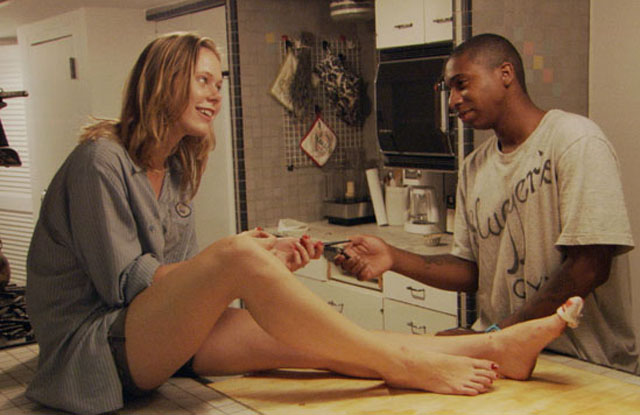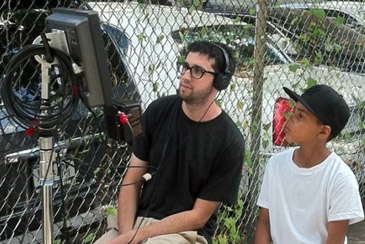CHICAGO – In anticipation of the scariest week of the year, HollywoodChicago.com launches its 2024 Movie Gifts series, which will suggest DVDs and collections for holiday giving.
Interview: Indie Spirit Winner Adam Leon for ‘Gimme the Loot’
CHICAGO – The Independent Spirit Awards, to be announced at the ceremony on February 23rd, got a jump start on a few of their accolades last weekend. Adam Leon, director of the soon-to-be-released feature “Gimme the Loot,” took home the “Someone to Watch Award.”
“Gimme the Loot” is a one of a kind journey by two New York City youths, who happen to be graffiti artists. They are motivated to tag of one of the city’s showiest symbols – the “Big Apple” home run celebration symbol of the New York Mets. Their adventure consists of trying to raise the $500 dollars it will take to complete the assignment. This is Adam Leon’s debut, and he previewed the movie in October at the Chicago International Film Festival. The breezy and surprisingly funny romp is a testament to youth and its possibilities.
 Photo credit: Sundance Selects |
HollywoodChicago.com got an opportunity to talk to Adam Leon while he was in Chicago, and got an insight into his background and cinematic roots.
HollywoodChicago.com: This is quite a splash as a debut film. What elements of your life and experience in New York City inspired the characters and their journey?
Adam Leon: I think that growing up in New York City, I was able to put a lot of myself in both of the main characters. You may ask, how does a tough 17-year old African American girl like Sofia relate to a 30 year old white kid from Greenwich Village? I was just interested in exploring her angle. I saw these girls on the subway growing up – how they were different from me, how they were the same and how could I identify with them. I was much more interested in exploring that, than making a movie about a 30 year old white guy.
Besides identifying with them, I combined it with a lot of observation. For example, on the subway, teenagers would come in and be loud and boisterous, and everybody would move away. I would pretend to have my headphones on, and sit next to them, and write down what they said. [laughs]
HollywoodChicago.com: Street talk, including the florid use of profane language, is status quo in your film. In your opinion, are words as hurtful as physical harm as presented in your film, or are they simply words in this setting?
Leon: In this setting, they are simply words. There are a ton of curse words in the movie, we can’t shy away from that fact. I had to transcribe it for closed captioning, and I thought ‘I can’t believe I wrote this.’ [laughs] But it’s how these characters talk, we worked with actual graffiti writers. The cursing is not pointed or angry, except maybe during the physical attack scene. The words are off the cuff and colorful, that I think is authentic. I don’t think it’s offensive, by the end of the film I don’t think it’s felt a lot. I will say that in doing some Q&A or when people coming up to me after the movie, they’re cursing up a storm. It inspires bad language. [laughs]
HollywoodChicago.com: There are two women in the movie, Sofia and Ginnie, taking two different journeys. Which of those women that you created, do you think has more perspective about life – the privileged traveler Ginnie or the struggling artist Sofia?
Leon: I think that it’s Sofia. In some ways, Ginnie lives in a bubble, but in other ways Sofia does too – in fact, when they confront each other it’s the only time Sofia doesn’t know what to do. I feel that there is more of an awareness in Sofia, that comes from her background and circumstance. She survives as a graffiti artist, a girl in a boy’s world, and is from a tougher environment. They are both urban kids that grew up fast, but it’s even more accelerated with the circumstances of Sofia’s world. She’s not miserable, which was a point we wanted to make in the film, but Sofia has had to think more about the Ginnies of the world that Ginnie would think of Sofia.
 Photo credit: Sundance Selects |
HollywoodChicago.com: There is a lot of oddball humor in the film, despite the cruelty of the situations that Malcolm and Sofia encounter. How important was it for the narrative to keep a lightness along the progression of their actions?
Leon: It was the starting point for making the film in the first place. There are these kids that live these vivid and tough lives, but aren’t really miserable. That doesn’t mean we didn’t want to show their existence in an authentic and honest way, but in some ways it humanizes these types of characters more to see them go on an adventure rather than to see the worst moments of their lives. That exposes them as just kids.
You see this all the time in films like ‘Dazed and Confused’ and the John Hughes movies, but you don’t see it in the type of urban setting in my film. I felt like these are kids who have these adventures – and this might sound a bit preachy – but they deserve their story to be told as well. First and foremost, it’s about giving the audience a ride and having a fun time at the movies, in this world and with these characters, which I hope is unique.
HollywoodChicago.com: There are stark elements of socio-economic separation in the interplay between Ginnie and Malcolm. How does this symbolize the whole of New York City, caught between the extreme wealth and the struggle of everyone else?
Leon: In some ways, I really wanted to create these characters and make them seem genuine, and then let somebody else interpret it. As I grew up in the social and economic melting pot of New York City – all of these races, ethnicities. wealth levels, class and personal histories – they are all thrown together and they all cross paths. That’s especially true with the teenagers in the city, for example the marijuana dealer will be at the party, because they know the guy. You wouldn’t necessarily find that in a suburban environment. I was more interested in that relationship and forced connection, than a commentary on what it means..
HollywoodChicago.com: Using the NY Mets home run apple as a plot device is quite clever. Again, where do you see the separation between a goofy marketing device for a baseball team versus street artists who can’t even afford a ticket?
Leon: Right, there is a running theme about their refusal to call it Citi Field, because they’re not going to acknowledge it is named after a bank. [laughs] There is a resentment toward how corny it is and corporate-ness of all that. They have no love towards the Met’s home run apple. It is this ridiculous thing – it fits appropriately into the tone of the movie.
HollywoodChicago.com: How important was it to all the divergent characters to have a human moment between Ginnie, Malcolm and Sofia at that water tower scene in the film?
Leon: It was there pretty early in the writing process, and it was really essential. Here are these three incredibly confident, cocky characters, but when confronted with each other, they’re all scared, even though they have no reason to be that way. Hopefully, there is a lot there at that moment.
HollywoodChicago.com: What was the moment you had in your younger days that made you decide to be a filmmaker, and how does that moment keep coming up as your are actually practicing it?
 Photo credit: Sundance Selects |
Leon: It was really early, probably when I was 4 or 5 years old. I basically have wanted to do this my whole life. It goes back to the original ‘Star Wars’ trilogy, and the realization that I could make that happen, was exciting to me. That idea of making a movie, telling stories to an audience, is what I keep going back to. I want to make movies that have the potential of being somebody’s favorite movie of that year. Is the story I want to tell new and exciting, and is there a way I can tell it that would move an audience in some way? Because that is what ‘Star Wars’ did for me.
HollywoodChicago.com: Which director or directors have influenced you the most, and do you ever pay tribute to them within the context of ‘Gimme the Loot’?
Leon: Growing up in the city, Woody Allen was someone who I was legally forced to watch as a filmmaker. [laughs] He’s a huge influence on me, and in the context of the film it was about capturing a part of New York City like he did. Also Jonathan Demme, a tonal touch like ‘Something Wild.’ Robert Altman is my film making idol, but I wouldn’t dare touch it. My Director of Photography and the producer would tease me by saying, ‘Altman would do that.’ There is one scene when Malcolm first comes into Ginnie’s room and looks around, there is a bit of the Altman ‘floating camera’ at work.
Finally, I’m obsessed – as many filmmakers are – with Stanley Kubrick. I think the best shot in cinema is his signature slow zoom out. We do a couple in the film, but no one would mistake us for Kubrick. [laughs] I try to steal from the best of them, but those are the people who come to mind.
 | By PATRICK McDONALD |


